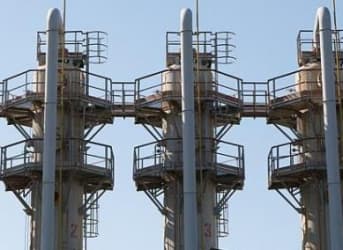Ukraine’s bid to rid itself of its dependence on Russian energy just took a huge hit.
Chevron announced that it was pulling out of a deal that it made with the Ukrainian government to develop shale gas in western Ukraine. The $10 billion deal was signed before the ouster of former Ukrainian President Viktor Yanukovych.
Chevron indicated that it was unsatisfied with the tax regime in Ukraine, after the post-Yanukovych government raised energy taxes. “We have just terminated that PSA (product sharing agreement),” said Peter Clark, Chevron’s country manager in Ukraine, according to Kyiv Post. “When it was signed, things had to be done, but not all of them got done.”
The deal with Chevron was signed in November 2013, and called for Chevron to invest $350 million over the first two to three years to develop Ukraine’s Olesska field in the western part of the country. The agreement kept open the possibility of ramping up investments to $10 billion over the course of Chevron’s 50-year lease. The Olesska field was expected to produce 10 billion cubic meters of gas each year when it was up and running.
Related: Ukraine Sends Russia Huge Advance Payment For Gas
But Chevron insisted that it would only move forward if the Ukrainian government simplified a series of tax laws. With no action from Kyiv, Chevron has decided it cannot move forward, and informed the Ukrainian government on December 15 of its intention to pull out of the deal.
The move is only the latest in a series of investment setbacks for multinational oil companies in Ukraine. In June 2014, Royal Dutch Shell decided to suspend operations on its Yuzivska field, located in eastern Ukraine due to the violence between the Ukrainian government and Russian separatists. The Yuzivska field is an 8,000 square kilometer located in Donetsk, an eastern province that has seen most of the violence in 2014. Shell decided to take a “time out” in order to protect its personnel.
And in March, ExxonMobil had to put on ice ambitious plans to develop offshore gas fields in the Black Sea after Russia annexed Crimea. The Skifska project was expected to have amounted to a $12 billion investment that could have seen 8 to 10 billion cubic meters of natural gas produced beginning in 2017. The annexation of Crimea now puts the Skifska reserves, estimated to be in the range of 3 trillion cubic feet, in disputed territory.
Chevron was thought to be better situated than Shell since its concession was located in the west, far from the fighting. Energy analysts predicted that that Chevron’s deal could be one of the few major gas projects that would be able to survive the crisis with Russia.
Related: Ukraine-Russia Gas Deal Still Possible Despite Setback
According to Chevron, Ukraine’s unfriendly tax regime did more to kill off the Olesska project than a brewing civil war in the east has. Still, Chevron’s Peter Clark says that the deal is not entirely dead yet, and the company is still working with the Ukrainian government to see if they can agree on a way forward.
In the meantime, Ukraine remains highly dependent on Russia, where it gets about 50 percent of its natural gas. Russia had cut off gas supplies to Ukraine from June through October, but the two sides came to an agreement at the end of October. With the backing of the European Union and the International Monetary Fund, Ukraine and Russia agreed on a price that should ensure smooth deliveries through at least the first quarter of 2015. With winter setting in, that deal likely calmed the nerves of many Ukrainians worried about heating over the next several months.
But after several gas deals have fallen through, the longer-term answer for Ukraine’s energy security is much less certain.
By Nick Cunningham of Oilprice.com
More Top Reads From Oilprice.com:
- Ukraine’s Next Energy Minister Will Be Bought and Paid For, As Usual
- Russia Hopes To Win Turkey Over With New Pipeline Deal
- The Global Energy Security War


















